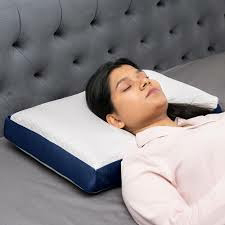Selecting the best pillow for good sleep is a personal choice, as everyone has unique sleep preferences and needs. However, there are a few key factors to consider when choosing the right pillow:
1. Sleeping position: Take into account your preferred sleeping position – side, back, or stomach. Different positions require different types of support. For example, side sleepers typically benefit from a firm pillow that keeps the spine aligned, while back and stomach sleepers may prefer softer pillows to maintain proper neck alignment.
2. Pillow filling: Pillows come in various fillings, each offering different levels of support and comfort. Common types include memory foam, down/feather, synthetic fiber, and latex. Try different options to see what feels most comfortable for you, considering factors like firmness, support, and breathability.
3. Neck support: Proper neck support is crucial to help alleviate neck pain and provide a comfortable sleep experience. Look for pillows that offer adequate height and contour to support the natural curvature of your neck and spine.
4. Allergies: If you have allergies or sensitivities, opt for hypoallergenic and anti-microbial pillows that resist the growth of allergens like dust mites, mold, and bacteria.
5. Pillow size: Consider your bed size and personal preferences when choosing the pillow size. Standard, queen, and king-size pillows are common options, but you can also find specialty pillows designed for specific needs, such as body pillows or neck rolls.
6. Trial period: Some pillow brands offer trial periods, allowing you to test the pillow for a certain period before committing. This can be helpful since pillows can feel different over time, and it's essential to assess their long-term comfort.
7. Budget: Determine your budget range and explore pillows within that range. Remember that investing in a good quality pillow that supports your sleep needs is worth considering.
8. Pillow loft: Consider the loft or thickness of the pillow. Some people prefer a higher loft, while others prefer a lower loft. The loft of the pillow can affect the alignment of your spine and the level of comfort provided. Experiment with different pillow thicknesses to find the one that supports your neck and head in a comfortable position.
9. Temperature regulation: If you tend to sleep hot, look for pillows with cooling properties. Certain materials like gel-infused memory foam or breathable fabrics can help dissipate heat and keep you cool throughout the night.
10. Durability: Consider the durability of the pillow. Pillows that maintain their shape and support over time can provide long-lasting comfort. Look for pillows that are known to be durable and retain their quality after extended use.
11. Personal preferences: Your personal preferences play a significant role in choosing the best pillow. Think about your preferred pillow firmness, texture, and overall feel. Some people may prefer a soft and plush pillow, while others may prefer a firmer and more supportive one. It's important to find a pillow that matches your individual preferences for maximum comfort.
12. Read reviews: Before making a purchase, read reviews from other customers to get a better understanding of the pillow's quality, comfort, and durability. Other people's experiences can provide valuable insights and help you make an informed decision.
Remember that finding the perfect pillow may require some trial and error. It's worth taking the time to invest in a high-quality pillow that fits your sleep needs and preferences. A comfortable and supportive pillow can have a significant impact on your sleep quality and overall well-being.




4 comments:
Nice articles and your information valuable and good articles thank for the sharing information sleeping pillow
How the right pillow can help reduce stress
Choosing the right pillow can significantly reduce stress by providing proper neck and spine alignment, improving sleep quality. A comfortable pillow helps relieve tension, enhances relaxation, and supports better rest, ultimately leading to a calmer, more refreshed mind.
https://www.rinipo.com/
These cooling pillows are a game-changer for hot sleepers—stay cool, comfortable, and well-rested all night long!
https://www.rinipo.com/
“I’ve been using Rinipo’s Knee Support Pillow for a few weeks now, and the difference is amazing—no more hip pain and I finally wake up refreshed.”
https://www.rinipo.com/
Post a Comment